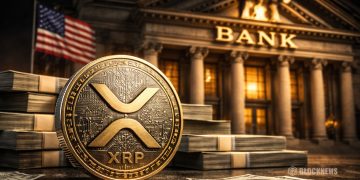In this recap of the crypto world, we will explore the events and news that had the most significant impact in the past week of July 17. Our focus will be on the following developments:
- Binance Integrates the Bitcoin Lightning Network
- Uniswap Launches UniswapX
- Tesla Diamond Hands its BTC Holding
- RFK Jr. Announces Plan to Back the Dollar with Bitcoin
- US Federal Reserve Officially launches FedNow
Binance Integrates the Bitcoin Lightning Network
In the fast-paced and ever-evolving world of cryptocurrency trading, Binance has once again taken center stage with a groundbreaking achievement – the successful integration of the Bitcoin Lightning Network. This cutting-edge scaling solution, situated atop the Bitcoin blockchain, promises to revolutionize the way users interact with their Bitcoin holdings.
With this groundbreaking initiative, Binance allows its users to harness the power of a layer-2 scaling solution for withdrawing Bitcoin. But the innovation does not end there – Binance has gone the extra mile by allocating specific Bitcoin deposit addresses exclusively for the Lightning Network, providing a seamless pathway for users to access their Bitcoin deposit address through the platform.
At the heart of this innovative integration lies the Lightning Network’s primary objective – to re-engineer Bitcoin transactions and make them faster and more cost-effective. This is achieved by empowering users to initiate off-chain transaction channels, effectively turbocharging transaction speeds while drastically cutting down costs.
This user-friendly development sets Binance apart from its competitors like Coinbase, Kraken, and Crypto.com. By embracing the Lightning Network, Binance users now have the privilege of enjoying nearly instantaneous Bitcoin transactions, a stark contrast to the customary ten-minute confirmation time. Furthermore, this transformative scaling solution also comes with a remarkable reduction in transaction fees, now a mere $0.04 compared to the once-excessive $30 peak experienced with regular Bitcoin deposits. Read more on this here.
Uniswap Launches UniswapX
In a groundbreaking move that promises to redefine decentralized finance (DeFi) trading, Uniswap has unveiled its latest creation, UniswapX. Published in a new whitepaper on July 17, 2023, UniswapX is set to transform the landscape of trading within Ethereum DeFi networks, bringing enhanced flexibility and efficiency to the table.
At its core, UniswapX is an EVM-compatible, non-custodial Dutch auction-based trading platform. Its decentralized swapping protocol aims to redefine the way users engage in trades, leveraging both on-chain and off-chain liquidity to offer unparalleled trade orders.
To facilitate seamless trades, UniswapX introduces two main parties: swappers and fillers. Swappers are users who initiate trade orders, while fillers are the ones responsible for executing these orders. By decentralizing the routing of trade orders, UniswapX allows fillers to direct orders to sources of both on-chain and off-chain liquidity for smooth execution. As a reward for their efforts, fillers are compensated with a percentage from each successfully filled order.
What sets UniswapX apart from conventional trading protocols is its ingenious use of Dutch Orders. Based on the Dutch auction trading model, this innovative approach lists assets for sale at initially high prices that progressively decrease over time until all listings are sold. This mechanism ensures that swappers get the most competitive prices, maximizing their gains in every trade. Gone are the days of uncertainty over securing the best price, as UniswapX guarantees transparency by recording and settling all transactions on-chain. Every trade is efficiently backstopped by the Uniswap Smart Order Router, creating a competitive environment for fillers to ensure the integrity and fairness of each trade executed. Read more on this here.
Tesla Diamond Hands its BTC Holding
In a remarkable display of conviction, Tesla, the prominent automotive and clean energy giant led by visionary entrepreneur Elon Musk, has reaffirmed its unwavering stance on its remaining Bitcoin holdings. After an eventful journey into the world of cryptocurrencies, Tesla now stands firm, holding onto its remaining Bitcoin stash.
Tesla’s crypto journey began in 2021 when the company made a bold move by investing a staggering $1.5 billion into Bitcoin. This audacious step not only showcased Tesla’s pioneering spirit but also sent a strong message to the financial world about the potential of cryptocurrencies as a store of value.
However, as is the nature of any investment landscape, strategic decisions are often made to navigate through ever-changing market conditions. In 2022, Tesla raised eyebrows by selling off 75% of its Bitcoin holdings, translating to more than 30,000 Bitcoins, and equivalent to $936 million.
Since then, Tesla has demonstrated a commendable display of “diamond hands,” holding onto its remaining BTC investments despite market volatility. As per Coindesk, Tesla has held steadfastly to its Bitcoin holdings of approximately $184 million for four consecutive quarters, including the recent Q2 2023 earnings release on July 19, refraining from both selling or adding to its position.
RFK Jr. Announces Plan to Back the Dollar with Bitcoin
Presidential candidate Robert F. Kennedy Jr. has recently made headlines with his audacious plan to anchor the U.S. dollar to hard assets like Bitcoin, gold, silver, or platinum if he is elected in 2024. Kennedy unveiled his ambitious proposal during a Heal-The-Divide PAC event on July 19th, emphasizing that these bold plans are aimed at ensuring the stability and resilience of the American economy.
Kennedy’s revolutionary plan centers on allocating 1% of issued T-bills to be backed by a hard currency, with Bitcoin being a prominent contender. The outcome of this allocation will determine the potential for further increases in backing the dollar with digital assets. By tying a portion of the nation’s debt to Bitcoin and other precious metals, Kennedy aims to foster economic resilience and ensure the long-term sustainability of the U.S. dollar.
Kennedy further elaborated on his Bitcoin-focused policies, outlining his vision for exempting the Bitcoin to U.S. dollar conversion from capital gains tax. According to Kennedy, this policy not only seeks to protect citizens’ financial privacy but also aims to foster a conducive environment for establishing more businesses within America and nurturing innovation across various industries.
Embracing Bitcoin and cryptocurrency markets as a cornerstone of his economic vision, Kennedy envisions the move positioning the United States as a global leader in the world of digital assets and blockchain technology. By facilitating innovation and encouraging investments, the proposed policy changes could pave the way for a new era of global finances and entrepreneurial ventures. Read more on this here.
US Federal Reserve Officially launches FedNow
In a significant leap towards modernizing the U.S. payment infrastructure, the US Federal Reserve has officially introduced its long-awaited FedNow instant payment system. With the announcement made on Thursday, the system has been set in motion, with 35 banks and credit unions already utilizing its real-time payment and settlement capabilities.
Initially unveiled in August 2019, FedNow is a real-time payment and settlement service devised by the US Federal Reserve. Its ambitious goal is to enable instant payment processing 24 hours a day, seven days a week, and 365 days a year, aiming to modernize and enhance the U.S. payment infrastructure. Emphasizing inclusivity, the system is designed to be accessible to financial institutions of all sizes, ensuring they can harness the benefits of a secure and efficient instant payment system.
The deployment of an instant payment system offers undeniable advantages across various financial and business sectors. As a result, the Federal Reserve has decided to run FedNow alongside its existing payment services. Moreover, the institution has expressed its dedication to collaborating with over 9,000 banks and credit unions across the nation to ensure widespread access to this groundbreaking service.It is worth noting that the current implementation of the system is solely focused on handling fiat bank funds, making it distinct from blockchain or stablecoin technology. However, as the service is being rolled out in stages, there is a potential avenue for future integration of a Central Bank Digital Currency (CBDC) with minimal additional effort. This possibility has piqued the interest of financial experts, eager to observe how the digital finance landscape evolves in response. Read more on this here.














